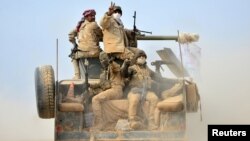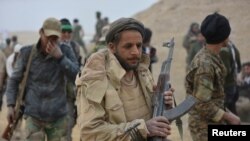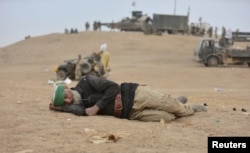An Arab tribal chief Wednesday accused Shi’ite militiamen west of the Iraqi city of Mosul of shelling civilians and of carrying out extrajudicial killings in villages near the town of Tal Afar.
Last week, Amnesty International said it had documented Shi’ite killings of Sunni Muslims in villages south of Mosul, Iraq’s second largest city and the Islamic State’s last major urban stronghold in Iraq, now under siege by Iraqi forces.
Shi’ite militia accused of killing civilians
Sheikh Juma’a Ahmed Dawwar, leader of the Sada Bakarah tribe in Nineveh, Mosul’s surrounding province, accused fighters from the Hashd al-Shaabi militia of slayings in villages seized from the jihadists. Currently the Shi’ite militia is thought to be besieging about 70 villages west of Mosul, which the sheikh says are being subjected to random shelling, including of residential areas.
He alleges the Shi’ite militiamen have executed dozens. The allegation will add to concerns that the Mosul offensive could trigger a widespread sectarian bloodbath. The claim by the sheikh is likely to prompt further calls by rights groups for the Iraqi authorities to investigate the reports of atrocities.
“This will reinforce the sectarian divide and make Sunnis turn to the Islamic State or any other violent Sunni group to defend them,” warned analyst Olivier Guitta, managing director of the London-based risk analysis firm GlobalStrat.
On Thursday, Amnesty said its researchers had documented half-a-dozen cases of Shi’ite militiamen wearing Iraqi Federal Police uniforms torturing and executing villagers suspected of having ties to the Islamic State terror group in al-Shura and al-Qayyarah, south of Mosul.
“Men in Federal Police uniforms have carried out multiple unlawful killings, apprehending and then deliberately killing in cold blood residents in villages south of Mosul. In some cases the residents were tortured before they were shot dead execution-style,” said Lynn Maalouf, a deputy research director at Amnesty.
She warned there appeared to be an assumption being made by Shi’ite militiamen that only IS fighters and supporters remained behind in captured Nineveh villages and that those uninvolved had fled or been rounded up by the jihadists and herded elsewhere to be used as human shields.
“There is a real risk that we could see war crimes of this kind repeated in other Iraqi villages and towns during the Mosul offensive,” she said.
A pledge to use regular Iraqi military
Because of fears of sectarian killings — and under pressure from the United States and other Western allies as well as rights groups — Iraq’s prime minister, Haider al-Abadi, promised before the launch of the assault on Mosul that only regular Iraqi forces would enter the Sunni-dominated city in the battle to oust jihadists who have controlled Mosul for two years.
He said Hashd al-Shaabi, an alliance of 40 militias, most heavily influenced by Iran, would be restricted to fighting west and south of the city. Some militia leaders have threatened to ignore the order, pledging publicly to be part of the fighting inside the city limits.
U.S. officials have warned Shi’ite militia leaders that if they fail to coordinate their operations with the regular Iraqi security forces, they risk being hit accidentally during the U.S.-led coalition air strikes.
Alleged atrocities
Social media footage has started appearing showing alleged Shi’ite atrocities. One posted video purportedly shows a Sunni teenager being forced under a tank, then shot just before the tank runs over him. VOA has been unable to verify the authenticity of the video.
In its report last week, Amnesty cited the rounding up on October 21 of about 10 men, including a 16-year-old boy from the villages of Na’na’a and al-Raseef, who were abused and beaten with rifle butts by men wearing police uniforms, who fired shots close to them and threatened to execute them. Three of the detainees were separated from the group, subjected to especially vicious beatings elsewhere and their bodies were found five days later. One of them had been decapitated — although it remains unclear whether the beheading had happened after his death.
No similar allegations of atrocities have so far been leveled against Iraqi security forces operating on the outskirts of Mosul and inside the city on the eastern front — even though the vast majority of regular soldiers are Shi’ite.
In dozens of interviews with VOA since the Mosul offensive was launched displaced Sunni civilians from the city say regular Iraqi forces have treated them as well as they fled their homes during lulls in fighting, providing food and water as they made their way to camps in Iraqi Kurdistan.
Civilians are frightened
Mohammed al-Zoro, shopkeeper from the al-Zahra district of Mosul, who fled the city last week with his family, told VOA that Iraqi and Kurdish forces welcomed them. He contrasted their behavior with IS militants.
“Daesh fires mortars on civilians as they leave and shoots at them,” he said, using an Arab acronym for IS.
But Sunni civilians are wary when leaving the city and entering territory controlled by Iraqi and Kurdish forces as they seek to work out how they will be treated. Many say they were frightened when they saw Shi’ite banners flying from Iraqi military vehicles or on buildings in villages captured by the Iraqi security forces. And there have been rumors of Shi’ite militiamen dressed in the combat fatigues of the regular army operating in villages on the eastern side of Mosul — although no firm evidence has been supplied so far.
One peshmerga general told VOA he doubted Hashd al-Shaabi has any presence in the eastern countryside of Mosul. But he added: “It is a mistake for the Iraqis to permit the Shi’ite flags to be flown by regular soldiers — it frightens a lot of people.”






